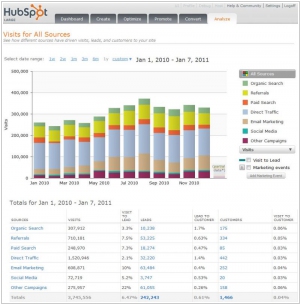HubSpot vs Salesforce
August 20, 2023 | Author: Sandeep Sharma
75

Most-popular CRM. Easy collaboration. Proven cloud platform. Salesforce.com offers everything you need to transform your business into a Social Enterprise, so you can connect to customers and employees like never before. With no software or hardware to install, you're up and running—and seeing a positive impact on your business—quickly.
HubSpot and Salesforce are two leading customer relationship management (CRM) platforms, but they differ in their approach, features, and target audience. HubSpot is known for its all-in-one inbound marketing and sales platform that provides a comprehensive suite of tools for marketing, sales, and customer service. It offers features for content creation, email marketing, lead generation, social media management, and analytics. HubSpot focuses on attracting and engaging with prospects through inbound marketing strategies, with an emphasis on building relationships and delivering personalized experiences.
Salesforce, on the other hand, is a widely used CRM platform that offers a broad range of functionalities for sales, marketing, and customer service. It provides tools for managing leads, opportunities, customer data, sales pipelines, and customer support cases. Salesforce is known for its robust customization options, scalability, and extensive third-party integrations. It is suitable for businesses of all sizes, from small startups to large enterprises, and offers industry-specific solutions.
See also: Top 10 Marketing software
Salesforce, on the other hand, is a widely used CRM platform that offers a broad range of functionalities for sales, marketing, and customer service. It provides tools for managing leads, opportunities, customer data, sales pipelines, and customer support cases. Salesforce is known for its robust customization options, scalability, and extensive third-party integrations. It is suitable for businesses of all sizes, from small startups to large enterprises, and offers industry-specific solutions.
See also: Top 10 Marketing software
HubSpot vs Salesforce in our news:
2023. Salesforce to acquire Airkit.ai, a low-code platform for building AI customer service agents
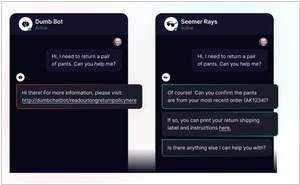
Salesforce is set to acquire Airkit.ai, a low-code platform designed to assist e-commerce enterprises in constructing AI-driven customer service agents. Initially conceived as a self-serve customer engagement platform, Airkit facilitated the integration of data silos and addressed various use cases like user onboarding. However, in a recent rebranding move, the company transformed into Airkit.ai and unveiled its inaugural integrated product, a GPT-4-powered platform enabling businesses like OpenTable and ShipBob to develop customized customer service chatbots capable of handling inquiries related to order status, refunds, product information, and more.
2023. HubSpot unveils strategy to integrate AI across the platform
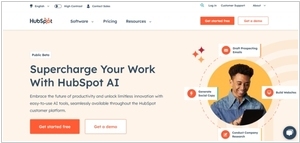
HubSpot, the marketing and CRM platform, has unveiled its comprehensive AI strategy known as HubSpot AI. While the incorporation of AI elements has been an ongoing effort for HubSpot and other enterprise SaaS vendors, the advent of technologies like ChatGPT has prompted HubSpot to adopt a more extensive approach while retaining earlier features. The CRM database stores valuable company data, enabling users to gain insights into customer profiles, encompassing basic information, purchase history, customer service interactions, and more. HubSpot AI encompasses a four-pronged strategy, starting with content assistants that assist users in generating various content types across the platform. Additionally, AI agents, currently in different development stages, aim to automate customer service tasks and answer queries. The third component, AI Insights, provides predictive analytics, such as identifying customers likely to churn or make a purchase, a capability integrated into the platform over time.
2023. Salesforce launches AI Cloud to bring models to the enterprise
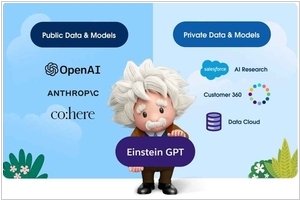
Salesforce is introducing a new collection of products with the goal of strengthening its position in the highly competitive field of AI. This suite, known as AI Cloud, consists of tools that are designed to provide AI solutions that are suitable for enterprise use. It represents Salesforce's latest effort to enhance its product lineup with AI capabilities across different disciplines. The launch of AI Cloud builds upon the company's previous generative AI initiative, which was introduced in March, aiming to incorporate generative AI throughout the entire Salesforce platform. AI Cloud serves as a hosting and delivery platform for AI models, specifically those focused on generating text, from a variety of partners such as Amazon Web Services, Anthropic, Cohere, and OpenAI. Additionally, Salesforce's own AI research division offers first-party models that power features like code generation and business process automation. Customers also have the option to bring their own custom-trained models to the platform while storing their data on their own infrastructure.
2020. Salesforce announces new Service Cloud workforce planning tool
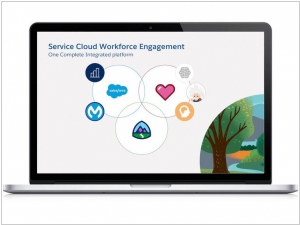
With a pandemic wreaking havoc in various parts of the globe, numerous companies are confronted with the challenge of managing dispersed customer service agents, leading to a complex workforce management situation. To address this issue, Salesforce is in the process of developing a new product called Service Cloud Workforce Engagement. Much like other Salesforce offerings, this solution comprises several crucial elements that work together to provide a comprehensive answer. Firstly, there is Service Forecast for Customer 360, a tool that utilizes AI to anticipate workforce requirements and intelligently allocate customer service requests. Furthermore, there is Omnichannel Capacity Planning, which aids managers in assigning customer service agents to channels like phone, messaging, or email based on the prevailing demand. Lastly, there is a training component designed to coach customer service agents on delivering accurate and appropriate responses tailored to specific situations.
2020. Salesforce applies AI to workflow with Einstein Automate
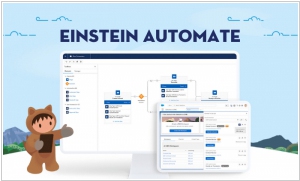
Salesforce has unveiled Einstein Automate, a new collection of workflow solutions powered by artificial intelligence (AI). Einstein serves as Salesforce's AI platform, encompassing all aspects of the company's product portfolio. It introduces automation to various tasks and simplifies the process of extracting valuable customer information, which often gets buried within vast amounts of data. Furthermore, Salesforce is incorporating MuleSoft, an integration company it acquired for $6.5 billion in 2018, into its offerings. This integration enables IT professionals to effortlessly build intricate connections between applications across the enterprise and the Salesforce suite of products, enhancing processes like mortgage approval workflows and more.
2020. HubSpot’s new end-to-end sales hub aims to simplify CRM for mid-market customers
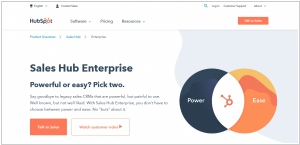
HubSpot, renowned for its role in shaping the concept of inbound marketing, has unveiled the HubSpot Sales Hub Enterprise. While the company has been providing a CRM tool for five years, which has successfully addressed the usability concerns of salespeople, the new offering aims to deliver a comprehensive approach that caters to the needs of not only sales professionals but also management and system administrators. HubSpot recognizes that larger players in the industry, such as Adobe, Salesforce, and SAP, typically acquire various components of the technology stack and integrate them into their solutions, or customers themselves piece together different elements. In contrast, HubSpot believes that developing a unified, integrated solution in-house will naturally result in a more user-friendly experience.
2020. Salesforce beefing up field service offering with AI
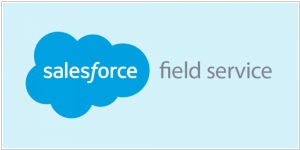
Salesforce is introducing AI-powered enhancements to its field service offerings, leveraging the capabilities of artificial intelligence. One of the key additions is Dynamic Priority, which allows the machine to set repair priorities based on factors such as service agreement type and criticality, streamlining call organization and enabling dispatchers to focus on other tasks. Furthermore, Salesforce aims to provide customers with a similar experience to tracking a driver's progress in a rideshare app. The introduction of Appointment Assistant, a new application, empowers customers to track the arrival time of their assigned repair person, ensuring they are aware of when to expect them.
2020. Salesforce announces a new mobile collaboration tool for sales called Anywhere
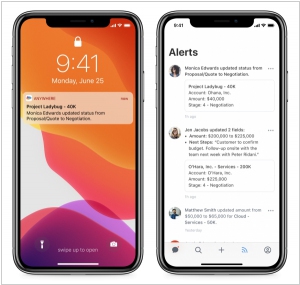
Salesforce has introduced a new tool called Salesforce Anywhere with the purpose of facilitating collaboration and data sharing among teams, regardless of their location. Recognizing the increasing significance of collaboration in a digital environment during the pandemic, the development of such an application became crucial for the company. The primary objective is to go beyond the confines of a traditional database and enable salespeople to access the most relevant information based on their sales pipelines. This tool allows employees to share information within their teams and engage in discussions related to that specific data. While there are other chat tools available, Salesforce Anywhere is specifically tailored for sharing Salesforce data, distinguishing it from more general-purpose platforms like Slack or other business chat tools.
2020. HubSpot unveils new content management system for marketers
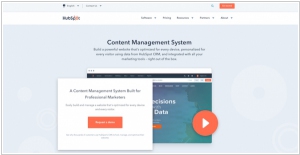
HubSpot, a renowned inbound marketing firm, has introduced a dedicated content management system (CMS) specifically designed to simplify the process of adding and updating content for marketing professionals. While content management has always been a fundamental aspect of HubSpot's offerings, this new CMS has been developed from scratch with marketers in mind. It provides developers with the flexibility to use their preferred programming languages while leveraging the modular structure of the HubSpot CMS. Simultaneously, the user-friendly interface empowers marketers to make frequent changes necessary for modern websites.
2018. Salesforce allows to enter data to CRM via voice

Sales managers are renowned for their verbal prowess, as talking is an integral part of their job. However, when it comes to entering customer data into a CRM system, they are faced with the arduous task of typing. Salesforce aims to alleviate this cognitive dissonance by introducing a new feature called Einstein Voice. This feature enables users to input data into the system effortlessly using natural speech. Just imagine, you hop into your car, open the mobile app, and have a conversation with a virtual assistant. You might say, "I just had a meeting with John Smith. He expressed interest in making a purchase but requested a follow-up call in a week...". The virtual assistant then dutifully adds a note to the customer's history in the CRM system. However, Salesforce might need to address the personality of their virtual assistant. It seems incongruous to task Einstein with such mundane responsibilities.

